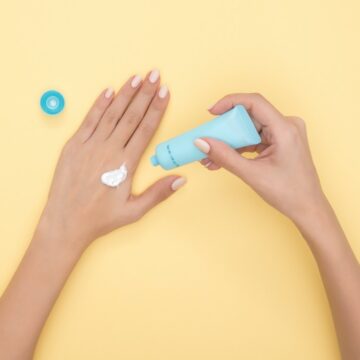
- Frequent hand washing and the wearing of masks can lead to skin damage.
- Damaged skin may heighten your risk for infections.
- Applying the right moisturizer to your hand and face is key to preventing dry and cracked skin.
The COVID-19 pandemic has made more people wash their hands or use hand sanitizers more frequently. It’s also common to see most people wearing face masks for the entire time they are in public or shared spaces. All these measures are crucial for preventing the spread of coronavirus. However, it can take a toll on the skin. Below are some tips to protect your skin from these damages.
Hand care

The Centers for Disease Control and Prevention (CDC) recommends washing your hands often with soap and water for at least 20 seconds or using a hand sanitizer with at least 60% alcohol.
However, frequent hand washing can remove the natural oils from your hands. Here’s how to prevent dry, cracked skin:
- Wash your hands with cool or lukewarm water. Using hot water isn’t any more effective than cold or lukewarm water in killing sickness-causing germs. Hot water can also aggravate skin damage. Likewise, antibacterial cleansers aren’t that effective for protecting you against infectious disease. They also contain chemicals that can cause skin irritation.
- Protect your hands when cleaning. Using disinfectants on surfaces are useful for wiping out germs, but they may contain ingredients that can be harsh on your skin. Make sure to wear gloves when handling these products.
- Moisturize. After washing and gently drying your hands, apply moisturizer generously. Use a hypoallergenic moisturizer that doesn’t contain fragrances and dyes that can cause skin irritation. Put the moisturizer where it’s easily accessible so you can easily repeat this step whenever your hands feel dry. You may also try combining moisturizers for the best results. Use lightweight creams with urea, glycerin or hyaluronic acid to add moisture to the skin’s outer layer. Seal in the moisture with a heavier moisturizer like oil-containing creams or petroleum jelly. Cover your hands with cotton gloves overnight if the heavier moisturizers feel greasy.
- Practice early skin protection. Moisturize your hands regularly, even if your hands don’t feel dry, to prevent skin irritation from developing in the first place.
Facial care

Masks are essential for reducing the spread of COVID-29, but constant use can also lead to skin chafing, itchiness, or rash on the nose bridge, chin, cheeks and behind the ears. Sweating under the mask can also cause skin problems, like acne breakouts. To prevent these complications:
- Establish a regular skincare routine. Cleanse and moisturize your face with non-comedogenic products before and after using a mask to prevent pore-clogging. Avoid products with petrolatum, as it can prevent your mask’s function, especially N95 masks. If you have oily skin, use a water-soluble moisturizer.
- Use a skin protectant to prevent friction. Wearing masks can cause friction or pressure, which can lead to skin injuries. Applying a thin layer of zinc oxide on your nose bridge or behind your ears can soothe and protect your skin. Zinc oxide is often used to relieve diaper rash or severely chapped skin. You can also place a bandage that conforms to the skin between the mask and the skin pressure points to provide relief while still allowing for proper mask use.
- Ease blisters. If you start getting blisters, clean them and treat them with topical antibiotic ointment. Use a bandage to protect the blister from friction or pressure from the mask.
- Treat acne. If you get acne, keep your skin clean and apply a water-soluble moisturizer. Treat your acne with products containing benzoyl peroxide or salicylic acid. Don’t pop or squeeze your pimples to prevent inflammation and infection.
Professional care

Washing hands and wearing masks are crucial for preventing the spread of COVID-19. Talk to your doctor immediately if your skin starts to crack and bleed, or when blisters become ulcers or infected, or if you develop a severe skin reaction. Skin damage may heighten your risk of infection and require prescription medicines, skin therapies, or even hospital care.
Via Mayo Clinic
